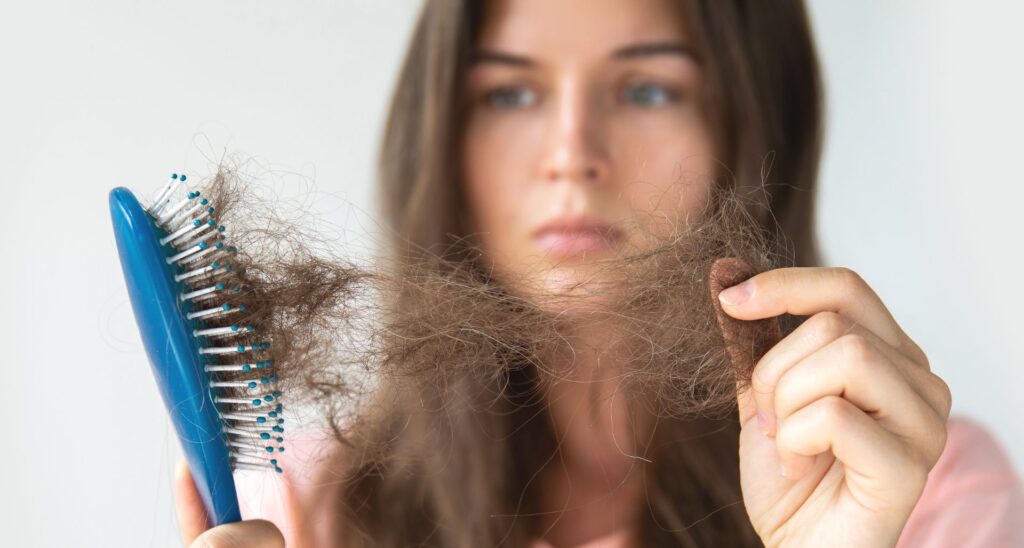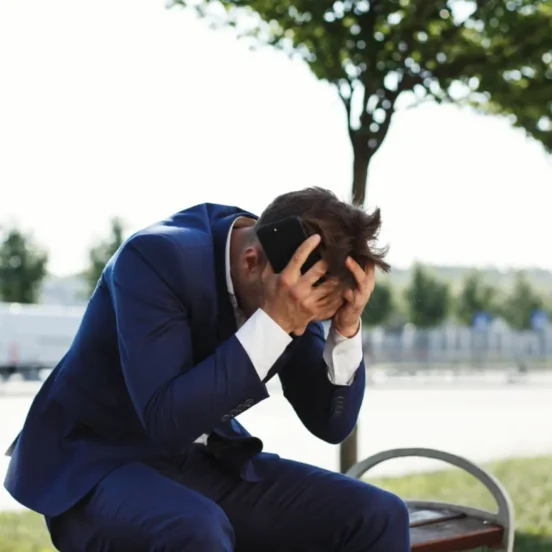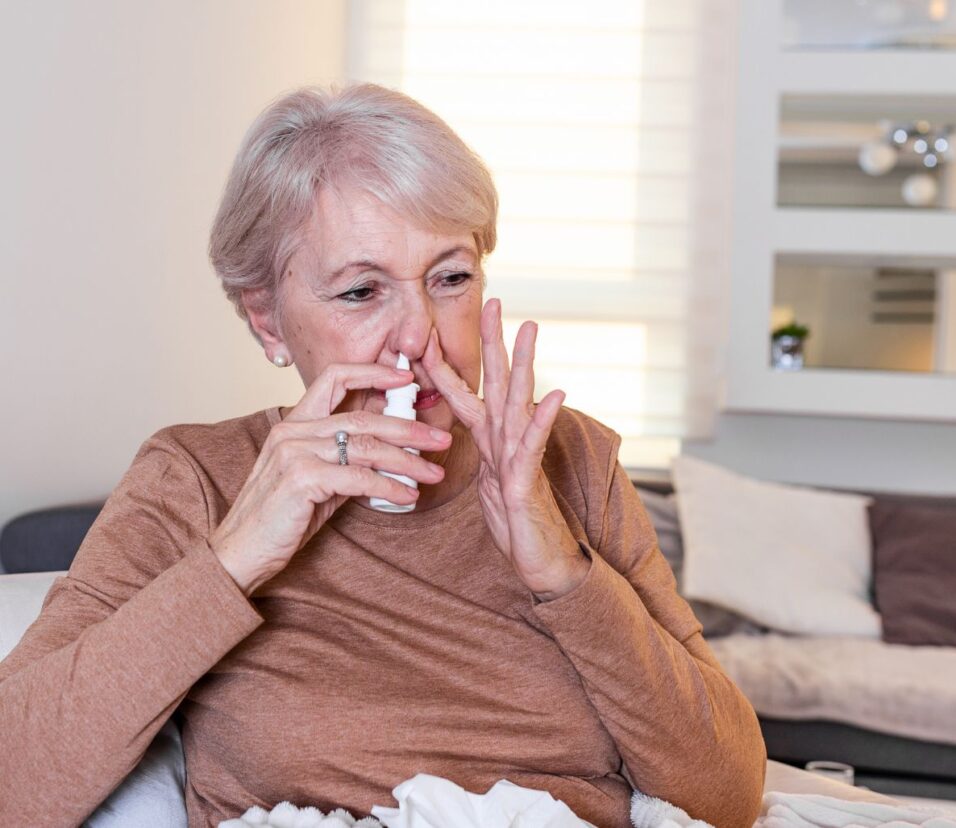Hair Loss and Depression: Understanding the Connection and Impact
Hair loss and depression are two seemingly unrelated issues that can actually be deeply interconnected. While many might view hair loss as a purely cosmetic concern, research suggests that it can have significant psychological effects, including depression.
Studies have shown that experiencing hair loss can lead to a decrease in self-esteem and body image dissatisfaction, which in turn can contribute to the development or exacerbation of depression symptoms.
Furthermore, the societal stigma surrounding hair loss can exacerbate feelings of shame and isolation, further impacting mental health. This highlights the importance of understanding the emotional impact of hair loss and addressing it as a holistic health concern.
Can Depression Cause Hair Loss?
While it’s widely recognized that experiencing significant stress can lead to hair loss, the question of whether depression directly causes hair loss remains complex. While depression itself may not directly trigger hair loss in the same way as stress does, the behaviors and physiological changes associated with depression can contribute to hair loss indirectly.
For example, individuals struggling with depression may neglect self-care routines, including proper nutrition and hair hygiene, which can impact hair health. Additionally, certain medications prescribed for depression may list hair loss as a side effect.
Furthermore, the physiological effects of depression, such as hormonal imbalances and increased inflammation, can potentially contribute to hair thinning or loss over time.
While further research is needed to understand the relationship between depression and hair loss fully, it’s crucial for individuals experiencing both conditions to seek comprehensive support and treatment to address their overall well-being.
Connection Between Hair Loss and Depression
Research has increasingly highlighted a significant connection between hair loss and depression, indicating a bidirectional relationship between the two conditions. On one hand, individuals experiencing hair loss may develop feelings of sadness, frustration, and low self-esteem due to changes in their appearance. This emotional distress can contribute to the development or worsening of depressive symptoms over time.
On the other hand, individuals already grappling with depression may be more susceptible to hair loss due to physiological changes associated with the condition, such as hormonal imbalances or increased stress levels.
Understanding this complex relationship is essential for healthcare professionals in providing comprehensive care for individuals affected by either hair loss or depression.
| Aspect | Hair Loss | Depression |
| Emotional Impact | Embarrassment, low self-esteem, anxiety | Sadness, frustration, low self-esteem |
| Psychological Effects | Decreased confidence, social withdrawal | Loss of interest, feelings of hopelessness |
| Risk Factors | Genetics, hormonal changes, stress | Genetics, trauma, chronic stress |
| Treatment Approaches | Topical medications, hair transplant | Therapy, medication, lifestyle changes |
Symptoms of Hair Loss Due to Stress
Hair loss induced by stress can manifest in various ways, often presenting as a noticeable thinning of hair or excessive shedding. Individuals experiencing stress-related hair loss may observe a sudden increase in the amount of hair lost during washing or brushing, or notice more hair accumulating on pillows and clothing.
Alongside physical symptoms, emotional distress may also accompany stress-induced hair loss, including feelings of anxiety, frustration, and self-consciousness about changes in appearance. Scalp tenderness or discomfort may also be present in some cases.
Understanding these symptoms can help individuals recognize stress-related hair loss early and seek appropriate support and interventions.
Symptoms of hair loss due to stress:
- Increased shedding during washing or brushing
- Noticeable thinning of hair, particularly at the crown or temples
- Excessive hair loss on pillows, clothing, or in shower drains
- Emotional distress, including anxiety and frustration about changes in appearance
- Scalp tenderness or discomfort
Female Hair Loss and Depression
Female hair loss can be particularly devastating due to the societal emphasis placed on hair as a symbol of femininity and beauty. It’s crucial to understand the unique connection between female hair loss and depression, and the various factors that contribute to this complex relationship.
Impact on Women:
- Greater Social Stigma: Women often face more societal pressure regarding appearance than men, making hair loss more visible and potentially embarrassing.
- Loss of Femininity: Hair is often associated with beauty and attractiveness, leading to a sense of loss of identity and self-worth for women experiencing hair loss.
- Increased Emotional Distress: These factors can contribute to anxiety, depression, and social isolation, creating a negative feedback loop.
- Hormonal Changes: Hair loss can be triggered by hormonal fluctuations, such as those during pregnancy, postpartum, menopause, or due to polycystic ovary syndrome (PCOS). These changes can already cause emotional upheaval, further amplifying the impact of hair loss.
Potential Causes:
- Androgenetic Alopecia (Female Pattern Hair Loss): This gradual thinning is the most common cause, often influenced by genetics and hormonal factors.
- Alopecia Areata: This autoimmune condition causes sudden, patchy baldness, which can be particularly stressful due to its rapid onset.
- Telogen Effluvium: This temporary shedding is often triggered by stress, illness, or significant life events.
- Thyroid Disorders: Thyroid imbalances can affect hair growth and contribute to hair loss.
- Nutritional Deficiencies: Deficiencies in iron, vitamin D, or other nutrients can impact hair health.
- Medical Treatments: Medications like chemotherapy or certain blood pressure medications can cause hair loss as a side effect.
Addressing the Connection:
- Early Diagnosis and Treatment: Seeking professional help from a dermatologist or trichologist can identify the cause and explore treatment options.
- Managing Stress: Stress reduction techniques like yoga, meditation, or therapy can help mitigate the impact of hair loss on emotions.
- Support Groups: Connecting with others experiencing similar challenges can provide valuable emotional support and understanding.
- Addressing Body Image: Working with a therapist or counselor can help develop a positive body image and self-acceptance despite hair loss.
- Exploring Hair Alternatives: Wigs, hairpieces, or scarves can offer temporary solutions and boost confidence.
Psychological Effects of Hair Loss
Experiencing hair loss can have profound psychological effects on individuals, impacting their sense of self-worth and confidence. Many people report feeling embarrassed, self-conscious, and even anxious about their appearance as a result of hair loss. This emotional distress can lead to a decline in mental well-being, with some individuals experiencing symptoms of depression and low self-esteem.
It’s more than just losing strands; it’s losing a part of oneself, triggering a cascade of complex emotions and anxieties.
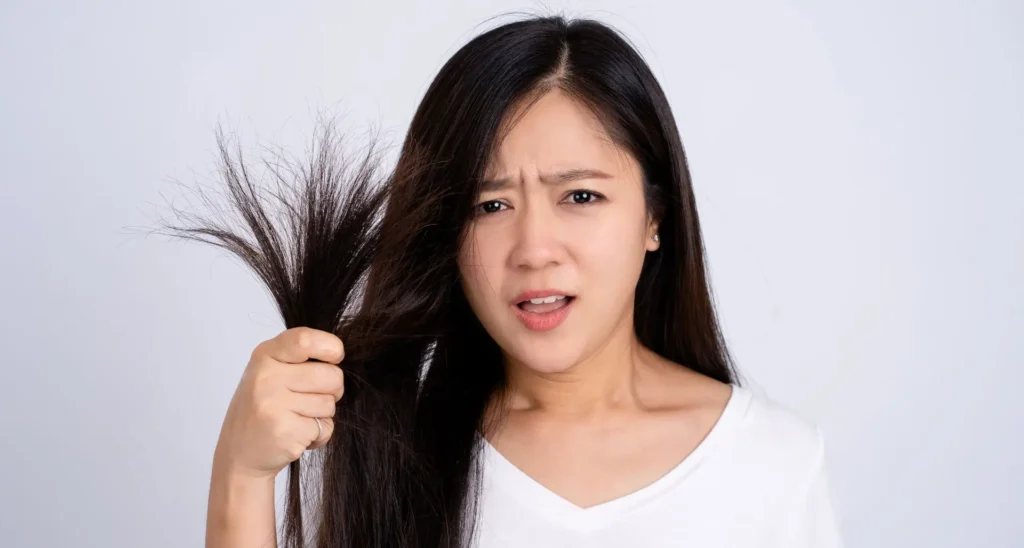
A Tangled Web of Emotions:
- Shattered Self-Esteem and Confidence: Hair is deeply intertwined with identity and social perception. Losing it can lead to feelings of shame, inadequacy, and a diminished sense of self-worth. Imagine staring in the mirror, seeing a reflection that doesn’t match your internal image, constantly worried about judgmental stares.
- Anxiety and Depression: The uncertainty surrounding hair loss, the fear of further progress, and the constant battle with negative self-talk can fuel anxiety and depression. It’s a relentless mental strain, a dark cloud hovering over everyday life.
- Social Isolation: The fear of being judged, stared at or pitied can lead to social withdrawal. Individuals with hair loss may avoid social gatherings, feeling like they don’t belong or fearing unwanted attention. This isolation can exacerbate feelings of loneliness and depression.
- Body Image Issues: Hair, especially for women, is often associated with beauty and femininity. Losing it can shatter these societal norms, leading to distorted body image and a constant struggle to reconcile the external with the internal perception.
A Spectrum of Experiences:
The severity of these psychological effects varies greatly depending on several factors:
- Cause of Hair Loss: Conditions like alopecia areata, with sudden patchy baldness, can be more stigmatizing than gradual thinning.
- Extent of Hair Loss: The more hair lost, the more significant the impact on self-image and confidence.
- Age and Gender: Young people and women, facing societal pressures around appearance, may find it harder to cope.
- Coping Mechanisms: Strong coping skills can help individuals manage the emotional turmoil.
Seeking Support:
Remember, you’re not alone. If you’re struggling with hair loss and its emotional toll, there’s help available:
- Talk to your doctor: They can address the underlying cause and offer treatment options.
- Seek therapy: A therapist can provide support, guidance, and coping mechanisms to manage the emotional impact.
- Join a support group: Connecting with others who understand your struggles can be immensely helpful.
Hair loss might be visible on the outside, but its effects run deep. By acknowledging the emotional burden and seeking support, you can navigate this journey with greater trength and resilience.
Vitamins for Hair Loss Due to Stress
While stress itself doesn’t directly cause hair loss, it can trigger a condition called Telogen Effluvium, where hair follicles prematurely enter the resting phase, leading to increased shedding. While managing stress is crucial for overall well-being and can indirectly help with hair health, certain vitamins can offer additional support for hair growth and overall health:
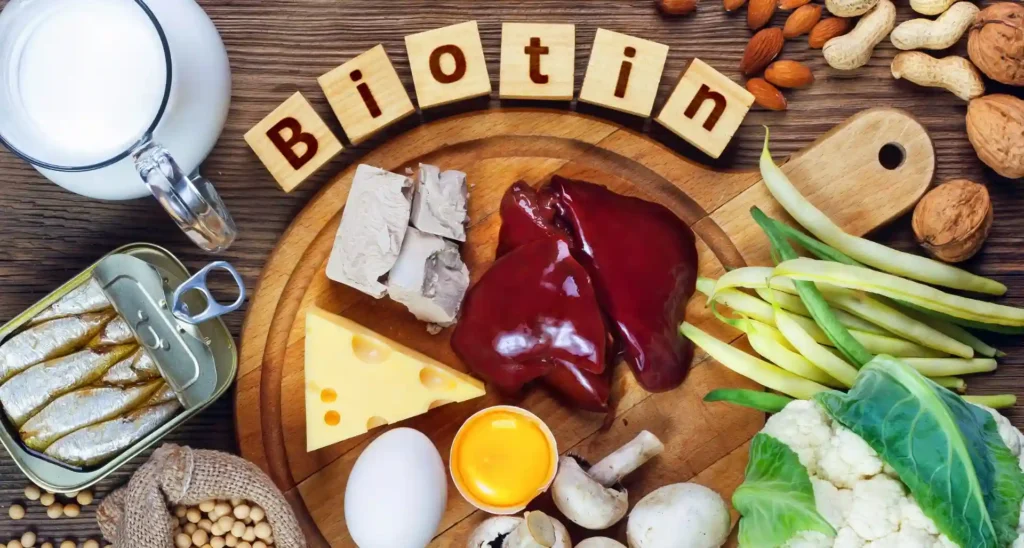
1. Biotin: This B vitamin plays a vital role in converting food into energy and is essential for healthy hair, skin, and nails. Studies suggest biotin deficiency can contribute to hair loss. Consider incorporating biotin-rich foods like eggs, nuts, and avocado into your diet, or consult your doctor about potential supplementation.

2. Vitamin D: This essential vitamin is crucial for various bodily functions, including hair growth. Deficiency has been linked to hair loss in some individuals. Sunlight exposure is the primary source of vitamin D, but dietary sources like fatty fish and fortified milk can also contribute. Consider getting your vitamin D levels checked by your doctor and discuss appropriate supplementation if needed.

3. Iron: Iron deficiency is a common cause of hair loss, especially in women. Iron helps transport oxygen to cells, including those in the hair follicles. Include iron-rich foods like red meat, lentils, and leafy greens in your diet. If you suspect iron deficiency, consult your doctor for a blood test and discuss supplementation options.

4. Zinc: This mineral plays a role in cell growth and repair, including those in the hair follicles. Zinc deficiency can contribute to hair loss. Include zinc-rich foods like oysters, beef, and pumpkin seeds in your diet. Consult your doctor before taking zinc supplements, as excessive intake can be harmful.

5. Omega-3 fatty acids: These healthy fats have anti-inflammatory properties and may promote hair growth. Include omega-3-rich foods like fatty fish, flaxseeds, and walnuts in your diet, or consider consulting your doctor about fish oil supplements.
Important Note: Before starting any new supplements, it’s crucial to consult your doctor, especially if you have any underlying health conditions or are taking medications. They can advise on the appropriateness and potential interactions of specific supplements based on your individual needs. Remember, a balanced diet and healthy lifestyle are essential for overall health and can contribute to healthy hair growth.
How to Regain Hair Loss From Stress
Hair loss due to stress (Telogen Effluvium) can be a frustrating experience, but the good news is that it’s often temporary and reversible. Here are some steps you can take to regain your hair and manage stress:
Reduce Stress:
- Identify and address your stressors: Are you experiencing work overload, relationship issues, or financial difficulties? Addressing the root cause of your stress can greatly improve your hair health.
- Practice relaxation techniques: Yoga, meditation, deep breathing exercises, and spending time in nature can effectively lower stress levels.
- Seek professional help: If you’re struggling to manage stress on your own, consider therapy or counseling.
Nutritional Support:
- Maintain a balanced diet: Ensure you’re getting enough protein, iron, vitamins D, B12, biotin, and omega-3 fatty acids, as deficiencies can contribute to hair loss.
- Consider supplements: Talk to your doctor about the potential benefits and dosage of biotin, Vitamin D, iron, or zinc supplements depending on your individual needs and possible interactions with medications.
Healthy Hair Practices:
- Avoid tight hairstyles: Braids, ponytails, and buns that pull on your hair can contribute to hair loss. Opt for looser styles.
- Gentle hair care: Use mild shampoos and conditioners, and avoid harsh styling products or excessive heat styling.
- Scalp massage: Regular scalp massages can improve blood circulation to the scalp, potentially promoting hair growth.
Medical Interventions:
- Minoxidil: This topical medication is available over the counter and can help stimulate hair growth.
- Finasteride: This prescription medication is effective for male pattern hair loss but is not recommended for women due to potential side effects.
- Low-level laser therapy: This treatment involves using lasers to stimulate hair growth, but its effectiveness varies and requires consultation with a doctor.
Remember!
Hair regrowth takes time; be patient and consistent with your efforts. Consult a dermatologist or trichologist for personalized diagnosis and treatment options. Address underlying health conditions that might be contributing to hair loss. Manage stress as a key factor in preventing future episodes of stress-related hair loss.
By taking a proactive approach and seeking professional advice when needed, you can reverse hair loss due to stress and regain your confidence.


